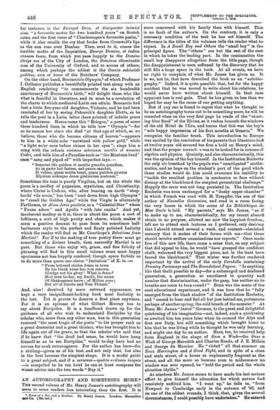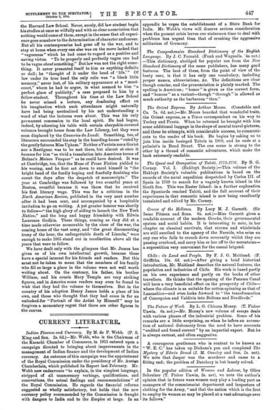AN AUTOBIOGRAPHY AND SOMETHING MORE.* THE second volume of Mr.
Henry James's autobiography will seem to some readers less interesting than the first. It is
• Note, of a Son and a Brother, By Henry Janice. London: Macmillan sad[Ia. net.] more concerned with his family than with himself. This= is no fault of the author's. On the contrary, it is only a necessary condition of the task be has set himself. The in the titles of the volumes tells the reader what to expect. In A Small Boy and Others the "small boy" is the- principal figure. The " others " are but the rest of the cast in which be takes the leading part. In the continuation the- small boy disappears altogether from the title-page, though the disappointment is soon softened by the discovery that he still fills a large space in the book. At all events, we have no right to complain of what Mr. James has given us. It is we, not lie, that have described the book as an " autobio- graphy." Indeed, it is quite possible that, but for the happy- accident that he was moved to write about his relations, he- would never have written about himself. In that case apparent loss is real gain. That he has given us less than we- hoped for may be the cause of our getting anything.
But if any one is found to regret that what he thought to- be an autobiography turns out to be something more, he will be- consoled when on the very first page he reads of the " shoot- ing blue flood" of the Rhone, as it rushes beneath the windows of the old Hotel de l'Ecu, and learns that this was the boy's- " sole happy impression of his first months at Geneva." We recognize the familiar touch. This introduction to Europe- was spoiled by the conviction of his parents that literature had at twelve years old secured too firm a hold on Henry's mind, and that the proper correcti-e was to be looked for in courses of algebra and physics. Quaintly, and also characteristically, this the opinion of the boy himself. In the Institution Rochette- the only air breathed by the pupils was " unmitigated " mathe- matics, and no hope on the student's part of the good which these studies would do him could overcome his inability to- " tackle the smallest problem in mechanics or face without. dismay at the blackboard the simplest geometrical challenge." Happily the error was not long persisted in. The Institution Rochette was soon exchanged for a "dusky upper chamber in which French was read with M. Toeppfer, the son of the- author of Nouvelles Genevoises, and read in a room facing- the very house in which the scene of La Bibliotheque de- Mon Oncle is laid. "My parents," says Mr. James, " as if to make up to me, characteristically, for my recent absurd strain to no purpose, allowed me now the happiest freedom,. left me to attend such lectures as I preferred, only desiring- that I should attend several a. week, and content—cherished memory that it makes of their forms with me—that these- should involve neither examinations nor reports." Once made- free of this new life, there came a sense that, on any subject that did appeal to him, he would "have grasped the confident chalk, welcomed the very biggest piece, not in the least have- feared the blackboard." That winter was further rendered important by the arrival of the early Cornhills containing Framley Parsonage and The Roundabout Papers. "Is anything like that thrill possible to day—for a submerged and deafened generation, a generation so smothered in quantity and number that discrimination, under the gasp, has neither air to. breathe nor room to turn round ?" Bonn was the scene of the- next educational experiment, and it was here that he "fully emerged from the black shadow " of the Institution Rochette, and " ceased to hear and feel all but just behind me, portentous• perhaps of another spring, the cold breath of the monster." At Bonn Mr. James " tasted" German, to the great and delightful quickening of his imagination—not, indeed, such a quickening as awaited him ten years later when he crossed the Alps andi first saw Italy, but still something which brought home to• him that he was living while he thought he was only learning, and might one day be an author. Here, too, he received help. from England in the shape of Once a Week—the Once at Week of George Meredith and Charles Reade, of J. E. Millais. and George du Manlier. He " rioted " all that summer on Evan Harrington and A Good Fight, and in spite of a close and stale street, of a house as unpleasantly fragrant as the street, and all the more so because even in midsummer no, window was over opened, he " held the period and the whole situation idyllic."
At nineteen Mr. James seems to have made his last serious effort to give himself the education for which nature had resolutely unfitted him. "I went up," he tells us, "from Newport to Cambridge early in the autumn of '62, and on one of the oddest errands, I think, that, given the several circumstances, I could possibly have undertaken." He entered. the Harvard Law School. Never, surely, did law student begin his studies at once so wilfully and with so clear aconviction that nothing would come of them, except in the sense that all experi- ence goes somehow to the determination of character andcareer. But all his contemporaries had gone off to the war, and to stay at home when every one else was on the move lacked that ." vagueness" which he had come to regard as a positive and saving virtue. " To be properly and perfectly vague one had to be vague about something." But law was not the right some- thing. It never presented itself to him as anything definite or dull ; he " thought of it under the head of life.' " Of law under its true bead the only relic was "a black little memory," never lost, of his solitary appearance at a " moot- court," where he had to argue, in what seemed to him "a perfect glare of publicity," a case proposed to him by a fellow-student. Throughout his time at the Law School he never missed a lecture, any deadening effect on his imagination which such attendance might naturally have had being neutralized by his not understanding a word of what the lectures were about. This was his only permanent concession to the local spirit. He had begun, indeed, by adorning his table with certain sheepskin-covered volumes brought home from the Law Library, but they were soon displaced by the Causeries du Lundi. Something, too, of literature surrounded his stay in the boarding-house " ruled by the gently fatuons Miss Upham." Neither aVautrin nora Goriot nor a Rastignac was to be met there, but almost at once it became for him "as vivid a translation into American terms of Balzac's Maison Vauquer" as he could have desired. It was at Cambridge, too, that the Muse of Prose Fiction yielded to his wooing, and he first sat down to enrol himself in "the bright band of the fondly hoping and fearfully doubting who count the days after the despatch of manuscripts." The year at Cambridge was followed by two eventful years at Boston, eventful because it was there that he received his first literary wage. This was for a criticism in the North American Beview, published in the very next number after it had been sent, and accompanied by a hospitable invitation to go on writing. A yet greater honour was shortly to follow—" the high glory of aiding to launch the New York Nation," and the long and happy friendship with Edwin Laurence Godkin. These things, coming as they did at a time made otherwise memorable by the close of the war, the coming home of the vast army, and "the great disconcerting irony of the hour, the unforgettable death of Lincoln," were enough to make 1865 stand out in recollection above all the years that were to follow.
We have dealt only with the glimpses that Mr. James has given us of his own intellectual growth, because these have a special interest for his friends and readers. But this must not be taken to mean that the members of his family who fill so large a place in the volume were not well worth writing about. On the contrary, his father, his brother William, and his cousin Mary Temple are very striking figures, and in America some readers may even be found to wish that they had the volume to themselves. But in the country of his adoption Henry James holds a place of his own, and those who thought that they bad come in for an unlooked-for "Portrait of the Artist by Himself " may be forgiven a momentary regret that there are other figures in the canvas.











































 Previous page
Previous page